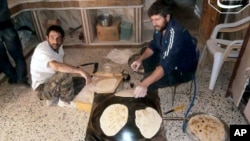GENEVA —
Families in Syria are increasingly resorting to begging for food to cope with shortages and high prices wrought by the civil war, the World Food Program (WFP) said on Tuesday.
The conflict between President Bashar al-Assad and rebels trying to overthrow him has killed 93,000 people, uprooted millions of people, destroyed livelihoods and wrecked property, businesses and infrastructure worth tens of billions of dollars.
A survey of 105 families conducted by WFP food monitors in seven provinces, including the hotspots of Homs and Aleppo in April and May, found many switching to lower-quality foods in order to spend less, the United Nations agency said.
“Those who cited begging as a coping strategy noted that it had become their only option to cope with the deterioration in their living conditions,” WFP spokeswoman Elisabeth Byrs told a news briefing in Geneva.
She said the WFP was stepping up food deliveries in Syria ahead of the start in early July of the Islamic holy month of Ramadan, during which devout Muslims fast from dawn to dusk and economic activities are disrupted.
“We have to anticipate that during month of Ramadan...some transport activities will slow down or stop. It is urgent to ensure delivery to ensure normal distribution to families.”
Some 9 percent of those interviewed reported begging for assistance, a rise from 5 percent in March, Byrs said.
“They need fresh products which are missing from their diet,” she told Reuters. “Many markets are not stocked or products are expensive”.
WFP hoped to reach 2.5 million Syrians with food supplies in June, up from 2.4 million in May.
The conflict between President Bashar al-Assad and rebels trying to overthrow him has killed 93,000 people, uprooted millions of people, destroyed livelihoods and wrecked property, businesses and infrastructure worth tens of billions of dollars.
A survey of 105 families conducted by WFP food monitors in seven provinces, including the hotspots of Homs and Aleppo in April and May, found many switching to lower-quality foods in order to spend less, the United Nations agency said.
“Those who cited begging as a coping strategy noted that it had become their only option to cope with the deterioration in their living conditions,” WFP spokeswoman Elisabeth Byrs told a news briefing in Geneva.
She said the WFP was stepping up food deliveries in Syria ahead of the start in early July of the Islamic holy month of Ramadan, during which devout Muslims fast from dawn to dusk and economic activities are disrupted.
“We have to anticipate that during month of Ramadan...some transport activities will slow down or stop. It is urgent to ensure delivery to ensure normal distribution to families.”
Some 9 percent of those interviewed reported begging for assistance, a rise from 5 percent in March, Byrs said.
“They need fresh products which are missing from their diet,” she told Reuters. “Many markets are not stocked or products are expensive”.
WFP hoped to reach 2.5 million Syrians with food supplies in June, up from 2.4 million in May.





